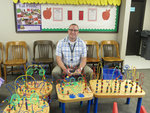

A background as a youth counselor and mental health worker, combined with a tenacious drive to ensure the best possible health outcomes for the people he serves, has set the scene for J.P. Anderson’s promotion to director of Lewis County Public Health and Social Services.
When he came onboard as the department’s deputy director in 2017, Anderson was fully aware of the tasks associated with running a regulatory public entity that performs a wide scope of essential services — from monitoring septic systems for contaminated water, to inspecting restaurants, to collaborating with physicians to prevent the outbreak of communicable diseases.
And while his colleagues in county government can attest to how Anderson’s knowledge of the issues and commitment to serving the best interests of local residents have propelled his ascension through the ranks, the 37-year-old administrator said he couldn’t be more grateful for the work of his supporting staff.
“As much as it’s fun to think about me and my career and to think of how I got here, there’s staff that have been here for 30 years holding the line and serving the community. The expertise they have … there may not be one person whose job I can do here. I can learn it, but I couldn’t walk in and do it right now,” said Anderson when commenting on his “lean” team of employees, many of whom are a “department of one.”
Anderson told The Chronicle that he views housing and homelessness being among the top few issues he’ll continue to focus on given the county’s rental housing vacancy rate of under 1 percent that, he said, could very well create a scenario where low-income families and individuals are priced out of the market.
Families having a safe place to live in is a primary component in determining their overall health outcomes, he said.
“We (Public Health) can’t build programming out of this; we can’t build low-income housing,” Anderson said. “A primary issue from our perspective is that the negative impacts connected with poverty and the negative impacts that are still felt because of the economic downturn that happened as timber went away as a primary industry that had a lot of family wage jobs — that hasn’t been replaced yet.”.
To that end, Anderson cited the need for community partnerships to address issues — such as students on the verge of homelessness — by pouring funds into schools, whereby counselors in Centralia, whose school district currently has the highest level of need, would be able to work closely with impoverished youth.
Another high-priority item on his agenda is making sure residents are offered access to a full and varied list of medical providers, particularly in more rural communities.
“People waiting for two-and-a-half months to see a provider is a real challenge that sometimes whole communities face. We face that. We don’t have the provider capacity that we would want,” stated Anderson.
Anderson is also a proponent of healthcare integration in which primary care and behavioral health cooperate in treating mental health and addiction.
“You’re looking at what the client needs. What the client’s saying their objective is and then you help them meet their goal. It’s not dictating to the client what recovery or success looks like to them,” the happily married father of three said.
Answering directly to the people and not meeting corporate demands has been a high priority in Anderson’s career. That dedication is a by-product of Anderson’s childhood in a family of social workers. Both his mother and father, he said, exuded a level of gratitude and humility that he constantly tries to maintain in his daily life.
But being a public servant alone isn’t what makes Anderson so fiercely optimistic about the future of his community, it’s also the community’s loyal and close-knit environment.
“One thing about my career in Lewis County and Lewis County that’s really remarkable is that although there have been hard times and an economic downturn, there is a real sense of identity and mission within the people who live here. When you meet someone in Pierce County, they say they’re from Tacoma and Puyallup. People here identify themselves with Lewis County,” he observed.